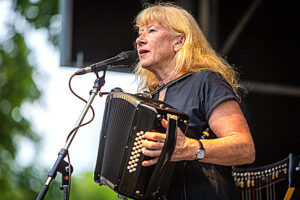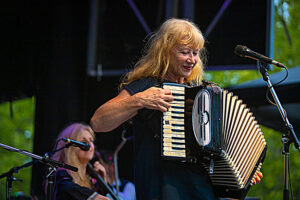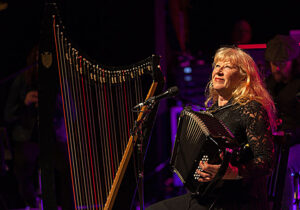
Canadian singer- songwriter Loreena McKennitt told David Hennessy about how Celtic music inspired her huge successful career of more than three decades.
Canadian singer-songwriter Loreena McKennitt has sold more than 14 million records worldwide.
Her recordings have achieved Gold, Platinum and multi-Platinum status in 15 countries on four continents.
She has twice been nominated for a GRAMMY Award and has won two Juno Awards, as well as a Billboard International Achievement Award.
In 2023, she was inducted into the Canadian Songwriter’s Hall of Fame.
Not bad for someone who wanted to be a veterinarian.
Loreena has now sustained international acclaim for over 30 years and has just released a new album, The Road Back Home, that harkens back to the earliest days of her career and the most traditional of Celtic music.
This was the music that first inspired her with Irish bands like The Bothy Band and Planxty moving her so much, she had to travel to Ireland where the music came from and where she herself has heritage.
Loreena told The Irish World: “I call it an accidental recording because last summer we were supposed to have gone and done a European tour but I felt it was better to postpone it so I had last summer sort of off.
“There had been a number of smaller folk festivals in southern Ontario that had asked me to perform for them over the years and for one reason or another, I wasn’t able to, so I thought this last summer might be the year.
“So I tapped into a local group of traditional Celtic musicians and I said, ‘What do you think about joining forces and doing a 60 minute set for these four folk festivals?’
“It really came about in quite a roundabout way.”

Originally from Morden, McKennitt moved to Winnipeg to study to be a veterinarian.
It was there that she discovered folk music.
After performing at the inaugural Winnipeg Folk Festival in 1974, McKennitt developed an interest in Celtic music and visited Ireland to hear it for herself.
You have Irish blood and Ireland’s always played a massive part in your story, hasn’t it?
“My family came from Scotland to Ireland, Donegal.
“They came to Canada in the 1830s. They were cattle drovers and my father was a cattle buyer so that part of our lineage came straight through to my contemporary times and I had worked plenty on the farm.
“I was living in Winnipeg and I belonged to a folk club, and a number of the members from that folk club were from Scotland, Ireland and England.
“This is the late 70s and they were bringing different recordings: Planxty, Bothy Band, Steeleye Span and Alan Stivell.
“I was smitten by the music, as I think many people around the world were.
“There’s something inherently infectious in some of the Celtic music that draws people to it, and it did me.
“It was much less a deliberate, conscious effort saying, ‘Oh, well, my history comes from Ireland’.
“It was something at more of an instinctive level so I just followed it but at that time, I didn’t know whether I was going to end up in theatre or musical theatre, I was flirting around with a bunch of things.
“I moved to Stratford, Ontario and worked at the Shakespearean Festival Theatre there for four years.
“I was in musical theatre.
“In fact, I wrote and performed music live at the Abbey Theatre in 1988.
“I really didn’t know where I was going or what I was aiming for. I kind of felt that my future lay in the arts but I didn’t know how it would manifest itself.
“And then 1985 when I wasn’t invited back I thought, ‘Well, I’m going to borrow that money my family had saved to send me to veterinarian college or university and make my first recording’, which was a big deal for them.
“My father only had his grade nine education as a cattle drover. My mother had a grade 11 education as a nurse so that was a large amount of money to advance their daughter without any track record of making a recording.
“I went into a studio and I made my first recording Elemental in one week and I ran off 30 cassettes.
“I gave away about 15 and the remaining 15, I decided I would go to the St. Lawrence Market in Toronto and busk and I sold my cassettes there and raised enough money to do my second recording and then put myself into church halls and school auditoriums and so on and built and then made enough money to run my third recording in ‘89.
“Then it was in ‘91, the major record companies came.
“It was the Warner Music Group that was able to recognize the fact that I had over those years from ‘85 to ‘91 developed the capacity to finance my own recordings.
“It became a licensing deal and much more of a partnership whereas most artists are just hired on like raw resources, so it’s a very grassroots story.
“But it began in that folk club in Winnipeg and then I felt that I really wanted to track down the music where it’s indigenously played.
“I’ve travelled to Ireland quite a number of times now that I have a strong affinity towards the landscape, the people, the hospitality, the cultural configuration.
“Then in ’90, ’91 I attended an exhibition in Venice that was the most extensive exhibition ever assembled on the Celts.
“I realised then that the Celts were much more than this mad collection of anarchists from Scotland, Ireland, Wales, and Brittany but they were this vast collection of tribes that fanned out across Europe into Asia Minor and dated back to about 500 BC.
“I was aware of a large troop of traditional musicians and groups that I felt were doing a far better job of performing the traditional music than I would and I thought that time, ‘I’m now going to look at the history of the Celts, and just set myself down a road of learning and discovery and I’ll write things based on that journey’.”

Tell me more about your time at the Abbey Theatre those years ago. Did you enjoy it? “I enjoyed it immensely.
“When I moved from Winnipeg to Ontario, I studied Irish history, particularly from about 1800.
“I just really wanted to understand more about Irish history and I would say only up until maybe a decade ago, I probably knew more about Irish history than I did about Canadian history.
“When I first went to Ireland in ‘81, I was thinking I would try to put together a one woman piece based on the Irish coming to Canada during the famine.
“I did a lot of research, went to the library in Dublin. That project was really fascinating. So having taken this course of Irish history gave me more of a foundation so when I spent time there in Dublin, I would go to places of different interest.
“I had a bicycle, I remember biking from the theatre at 10.30 at night and I’d go back to my bed and breakfast in Dun Laoghaire.”
You toured with The Chieftains, what was that like? “I loved it.
“I also appeared- as many, many artists did- on their recordings.
“This was back in the day when pretty much everyone was still intact: Derek Bell (who passed away in 2002) and I found Paddy (Moloney, passed in 2021) very, very generous and a really kind soul.
“I miss them.
“They were real trailblazers in their own way.”
You’re currently touring Europe not for The Road Back home but to celebrate your 1991 album The Visit on your The Visit Revisited tour.
What is it like to revisit a piece of work you released in 1991?
“I think for any artist it is, ‘Does it stand up in your own mind? Is it something you still relate to?’
“That’s the biggest question.
“Some of the inspiration for a couple of the pieces came from early trips to Ireland that I took to the west coast to county Clare around 1981 and ‘82.
“Essentially what I was interested and concerned about then and even more so now is the place and role of traditions and rituals and maybe even habits in everyday life.
“This gets back to the other recording (The Road Back Home), the concept of home.
“Home for me is much more than the building you go to at the end of your day but rather, for me anyway, this fabric of rituals and customs and traditions.
“When I’m at home I go to the same shop to pick up my physical newspaper every day, and go to the same coffee shop and sit and chat with my friends.
“That becomes part of this fabric.
“Songs like that reflect on what we might call the old ways as well.
“Is there value in some of those old ways?
“Are we just becoming too impatient and petulant that we just cast things off because we like flashy, new things?
“So that has a contemporary relevance to me.
“But the good news is that I still on the whole feel there’s enough integrity either in the melody or the chord structure or what’s being written about that I can connect with it today with commitment and sincerity.”

The Visit was your breakthrough and saw you chart for the first time in your native Canada before going on to become four times Platinum in Canada and gold in the US.
Did you know how special what you had was with The Visit?
“Oh, I didn’t know at all.
“I’ve never been one to follow the music industry as a fashion commodity.
“I was always just creating things that I just found interesting for my own edification.
“So a piece like The Lady of Shalott- I remember sitting in my car playing that for one of the Warner Canada executives after we had had dinner one night and I thought, ‘Oh my god, they’ll think I’ve just lost my mind by putting this 12 minute poem to music’.
“But I think it speaks to the unbelievable spectrum of music, the power of music as a medium.
“It’s quite sad how the music industry came to, over the course of time, reduce it down to this very disposable fashion commodity rather than understanding the complex psychological and sociological connections that it can have for people.
“It can be quite powerful.
“I always wanted to be a veterinarian.
“I never dreamed about being a singer so I’ve kind of come to the music not attracted at all by fame or anything else, but rather my own curiosity about things.
“I mean, clearly it’s worked out pretty well, but it (fame)’s not what gets me on the stage.
“I just came from meeting a couple that have come in from the Baltic Sea somewhere and they have been very touched by my music, and I find that quite humbling that it has that impact on some people.”
I bet it was easier after The Visit but that when you started out, you could never have foreseen this career.
“No, it was completely impossible.
“It’s such a different thing to when you set your focus on you want to be something, you want to do something and you have this long term vision.
“Well, I didn’t really which is why I maintain that music chose me rather than me it.
“So once I made this recording and then played on the streets and had people respond to what I was doing, that response was what gave me the confidence to keep going on and clearly was the hand reaching out to me saying, ‘You’re going to come with me this way’.
“I did.
“What I also learned early on was that I didn’t culturally belong. I don’t have a lot of commonality with most of the music industry.
“I think that’s sort of seen by the fact that I just don’t have a manager, I wouldn’t have a manager.
“I’m probably unmanageable.
“I wanted to conduct my life and my career based on my own values and principles and a lot of them didn’t line up with the music industry.”

In addition to her musical career, Loreena has been recognized for a number of noteworthy philanthropic initiatives.
“One of the things that I feel deeply passionate about has been the devastation that’s come with unregulated smartphones and internet and social media and the tech companies, I have pretty harsh feelings about all of that and have done so for about 10 years.
“We have hosted a few screenings and community gatherings to talk about this.
“I present it before school boards really lobbying to get smartphones out of the schools and out of the children’s hands, connecting with many child development experts who have been long warning about the mental health and all the devastating perils, whether it’s addictions and bullying and suicide, sextortion or human trafficking.
“I mean there’s no end of them.
“The music industry was the first to be harmed by the unregulated internet.
“We used to get paid 25 cents per song on CD and vinyl, we now get 10 cents per 1000 plays on Spotify or .0001 cents on Google Play.
“Ours was one of the first industries broken terribly by the unregulated industry but now you can see how many other businesses and industries have been seriously harmed.
“You know Mark Zuckerberg’s famous quote, ‘Unless you are breaking stuff, you aren’t moving fast enough’?
“Well, they’ve done that completely now: With our children, and now with our democracies.
“Now with the introduction of AI, it’s breaking society down.
“I think what’s coming up for our communities and our countries is going to be pretty tough.
“I think that our whole generation that’s been 80 years removed from war is going to have a real awakening.
“To have change, no problem but such vast change come so quickly, and such lack of care.
“We saw this all with fossil fuels and the industrial revolution and what that brought us was catastrophic climate change.
“I think it’s 10 times worse what these tech companies are responsible for.
“That has been my biggest passion.
“I think it touches absolutely every aspect of everyone’s life.
“We can’t even connect about climate change or any other perils because all these tech companies are weaponising them against us. We can’t even agree on what’s true or not.
“I know that they’ve also infected Ireland to a great degree.
“They came in there and got in tax free and all that bullsh*t.
“This whole business of people saying, ‘Well, what can you do?’ and throwing their hands up well, you actually can do a couple things: You can regulate them, and people can get the f**k off them.
“Sorry for my French, that’s how you do it but people have got to have the balls, they’ve got to have the courage, they’ve got to have the tenacity to do it.
“My smartphone is this unit here,” Loreena says showing a basic phone without internet or any apps. “And it’s not because I hate technology.
“It’s because I will not be co-opted.
“(People lived without smartphones) for a very long time.
“This is the biggest co-opting of the human race.
“It’ll be very interesting to see if history lives long enough to look at this window of time, this 25 years.
“This 25 years has just been beyond shameful.
“It’s been sold like a Trojan horse on the argument of efficiencies and conveniences.
“I don’t go to self-checkout, I go to a real person, I will always want to deal with a real person because for me, life is all about dealing with real people, not machines.
“I think that it’s more than high time that the average person gets with the program and gets off this stuff, and encourages their legislators or elected members of parliament- While we still have remnants of democracies- To get after these companies.
“This gig economy, it’s garbage. Uber’s garbage. Airbnb is garbage. It’s all garbage. It’s just garbage and people need to really understand how it’s harming society, and it’s harming people’s ability to make a living.”
Loreena McKennitt tours Europe with her 30th anniversary tour of The Mask and Mirror from June.
The Road Back Home is out now.
For more information, click here.



